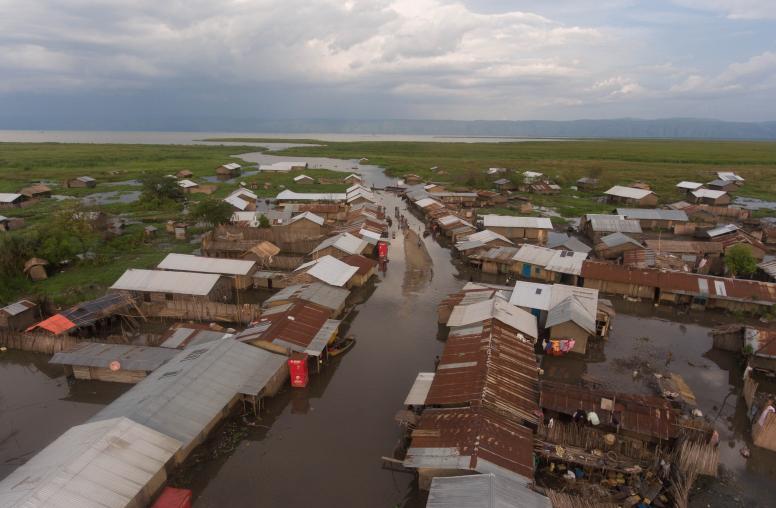Confronting the Next Wave of Violent Extremism
RESOLVE Network 2017 Global Forum
The Islamic State may be out in Mosul and on the back foot in Raqqa, but the next chapter in the global narrative of violent extremism has yet to be written. With violent extremists losing territorial control in the Middle East, foreign fighters are returning home and extremists are shifting tactics. On Wednesday, September 27, the U.S. Institute of Peace and the RESOLVE Network of global experts on violent extremism discussed issues such as the risks in hotspots across Asia, Africa, the Middle East and Europe at their annual forum.
The forum featured preeminent international scholars and experts from across the network’s 20-plus partner organizations around the world. In addition to offering opportunities to connect with leading thinkers, practitioners and policymakers involved in developing responses to violent extremism, the day of panels and roundtable discussions highlighted findings from a year-long study on the rise of violent extremism in Bangladesh and previewed upcoming research on the politics of religion in the Lake Chad Basin region.
Panelists addressed questions including what do we know about how and when terrorists decide to enter and exit violence, and how do the politics of religion, migration, and identity factor into efforts to counter violent extremism?
Continue the conversation on Twitter at #RESOLVEForum.
Current Agenda
8:15am - 9:00am - Registration & Coffee
9:00am - 9:20am - Welcome and Introductory Remarks (This session will be webcast.)
- Carla Koppell, Vice President, Applied Conflict Transformation, U.S. Institute of Peace
- Thomas Hushek, Acting Assistant Secretary, Bureau of Conflict and Stabilization Operations, U.S. Department of State
9:20am - 10:30am - After Raqqa: Responding to the Next Wave of Violent Extremism in a New Era (This session will be webcast.)
- Ali Soufan, CEO, The Soufan Group
- Geneive Abdo, Author, The New Sectarianism: The Arab Uprisings and the Rebirth of the Shi’a-Sunni Divide
- Sahar Aziz, Professor of Law and Chancellor’s Social Justice Scholar, Rutgers University Law School
- Moderator: Candace Rondeaux, Director, RESOLVE Network
10:30am - 11:00am - Coffee Break
11:00am - 12:15pm - Entering and Exiting Violence (This session will be webcast.)
- Dr. Dale Eickelman, Professor of Anthropology, Dartmouth College
- Dr. John Horgan, Professor, Global Studies Institute, Georgia State University
- Dr. Marc Sageman, Senior Fellow, Foreign Policy Research Institute
- Moderator: Ivo Veenkamp, Deputy Executive Director, Hedayah
12:15pm - 1:15pm - Lunch
1:15pm - 2:45pm - Concurrent Session - The Politics of Religion in the Lake Chad Basin (This session will be webcast.)
- Ambassador John Campbell, Senior Fellow, Council on Foreign Relations
- Ibrahim Yahaya Ibrahim, Professor, Department of Political Science, University of Florida
- Chris Kwaja, Senior Lecturer and Researcher at the Centre for Peace and Security Studies, Modibbo Adama University of Technology
- Moderator: Susan Stigant, Director, Africa Programs, U.S. Institute of Peace
1:15pm - 2:45pm - Concurrent Session - Bangladesh on the Brink: Surveying the Evolving Geography of Political Violence
- Wahid Abdallah, RESOLVE Network Research Fellow
- Salina Aziz, RESOLVE Network Research Fellow
- C. Christine Fair, Associate Professor, Security Studies Program, Edmund A. Walsh School of Foreign Service, Georgetown University
- Ali Riaz, Professor, Department of Politics and Government, Illinois State University
- Moderator: Andrew Blum, Executive Director, Kroc Institute for Peace and Justice
1:15pm - 2:45pm - Concurrent Session - The Demographics of Discontent: Identity, Migration, and Social Dislocation
- Camille Schyns, Program Officer, Libya and the Horn of Africa, European Institute of Peace
- Muhammad Amir Rana, Director, Pak Institute for Peace Studies
- Emily Winterbotham, Research Fellow, Royal United Services Institute
- Haldun Yalçınkaya, Coordinator, Security Studies, ORSAM
- Moderator: Gary Milante, Director, Peace and Development Programme, SIPRI
2:45pm - 3:15pm - Coffee Break
3:15pm - 4:30pm - Concurrent Session - Filling the Vacuum: Insecurity, Governance Gaps, and Extremism (This session will be webcast.)
- Cheryl Frank, Head of Transnational Threats and International Crime Division, Institute for Security Studies
- Farrah Hawana, Associate Program Coordinator, SANA Project, Small Arms Survey
- Philipp Rotmann, Associate Director, Global Public Policy Institute
- Imtiaz Gul, Executive Director, Center for Research and Security Studies
- Moderator: Cameron Chisholm, President and Founder, International Peace & Security Institute
3:15pm - 4:30pm - Concurrent Session - Bangladesh on the Brink: Community, Secularism, and Religion
- Mubashar Hasan, RESOLVE Network Research Fellow
- Niloy Biswas, RESOLVE Network Research Fellow
- Amena Mohsin, Center for Genocide Studies, Dhaka University
- Moderator: Matthew J. Nelson, Reader in Politics, SOAS, University of London
4:30pm - Reception



